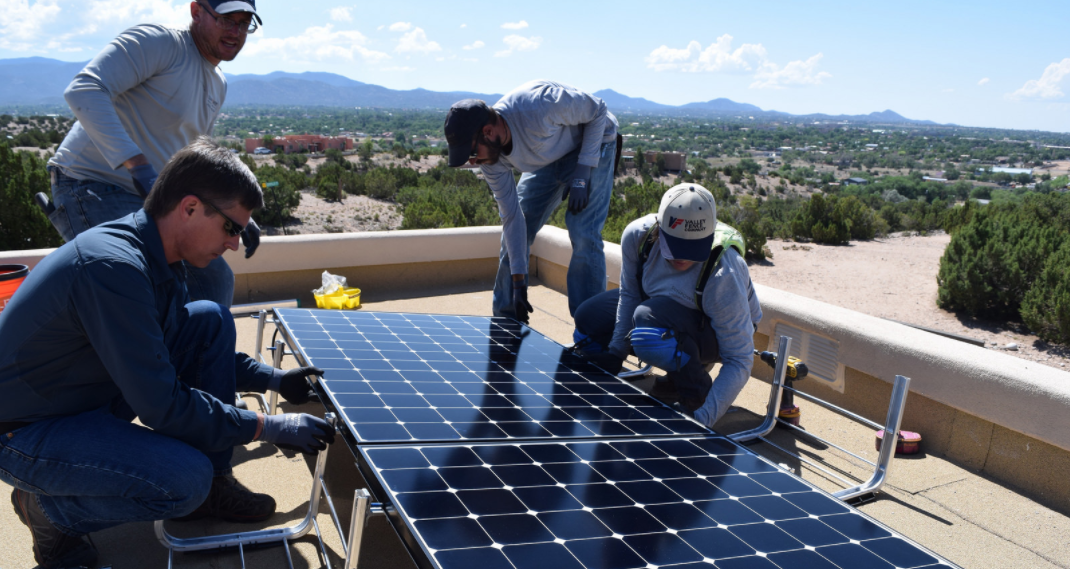Why hinder a rapidly growing industry?
PHOTO: U.S. Senator Heinrich helps install solar panels on a home in Santa Fe with a team from SunPower by Positive Energy Solar, one of the highest-grossing solar and renewable energy companies in New Mexico. July 5, 2017.
December 6, 2017
Dear Friend,
I testified today before the Office of the U.S. Trade Representative to oppose tariffs that could deeply damage the American solar industry. I hope you can take a moment to read and share the op-ed I wrote in this morning's Albuquerque Journal about the potentially devastating impact that trade restrictions that have been proposed to President Trump could have on New Mexico's booming solar industry.
I will continue standing up for New Mexico's clean energy economy. We can't afford to go backward in our fight against climate change or stall the major growth we have seen in wind and solar jobs in our state.
Sincerely,
MARTIN HEINRICH
United States Senator
By U.S. Senator Martin Heinrich / N.M. Democrat, Member of Senate Energy and Natural Resources Committee
Wednesday, December 6th, 2017
With our incredible resources for both solar and wind energy, alongside innovative research and development at our national laboratories and universities, New Mexico is poised to become a major producer and exporter of clean power. However, recent recommendations from the U.S. International Trade Commission (ITC) could threaten thousands of good-paying jobs across the American solar industry and set back our nation's efforts to transition to clean energy.
Last month, in response to a complaint filed by two domestic solar panel manufacturers, the ITC moved forward with three recommendations to President Trump to impose tariffs on certain imported solar panels and modules. I will testify today before the Office of the U.S. Trade Representative to oppose tariffs that could deeply damage the American solar industry. I have joined Republican Sen. Thom Tillis of North Carolina and a bipartisan group of senators to warn against the harm that could result from these trade restrictions.
Tariffs or price floors for solar panels might help a small number of domestic solar panel manufacturers stay in business, but the resulting spike in solar power prices would threaten the growth of the rest of the nation's solar industry, which employs more than 260,000 Americans. The Solar Energy Industries Association estimates that these tens of thousands of American workers will lose their jobs at a rate of 5 to 8 jobs lost for every job gained from the proposed trade restrictions.
Only a little more than 1 percent of the hundreds of thousands of American solar workers manufacture solar panels or modules. Even within solar manufacturing as a whole, approximately 20 times more American workers work for companies like New Mexico's Unirac that manufacture other equipment used to produce solar power. Those companies have warned that they may have to lay off employees if the United States imposes costly tariffs or quotas on imported panels.
The same grim picture is true for the hundreds of New Mexicans who work for local solar installation companies. Earlier this year, I had the privilege of joining a crew of installers with New Mexico company SunPower by Positive Energy Solar as they installed rooftop solar on a home in Santa Fe. They told me about the benefits of the booming growth of the solar industry and the great job opportunities for workers like them.
New Mexico has seen major job growth in the solar industry thanks to the rapidly declining cost of solar power. Nearly 3,000 New Mexicans work for companies that manufacture equipment, install residential rooftop solar and build utility-scale solar installations. We have seen a 54 percent growth in solar industry jobs in New Mexico in the past year alone.
I can't understand why we would want to thwart one of the nation's fastest-growing industries. Imposing tariffs would jeopardize the jobs of thousands of American workers, like the solar installers I met in Santa Fe, and billions of dollars of investment in communities across the nation. That would be the polar opposite of a trade policy that puts American workers first.
After reviewing the ITC's recommendations and hearing from the U.S. trade representative, President Trump will have until Jan. 12 to decide whether he will impose tariffs or any other restrictions on imported solar panels. I am urging the president to carefully consider the bigger picture of the American solar industry and recognize that any tariffs on imported solar panels would do more harm than good.
I remain committed to using my role on the Senate Energy and Natural Resources Committee to advocate for policies that move our nation and state's energy economy forward. I still strongly believe we can meet our climate goals, keep up our transition to cleaner and more sustainable sources of energy, and create thousands of new jobs in our communities.

.jpg)